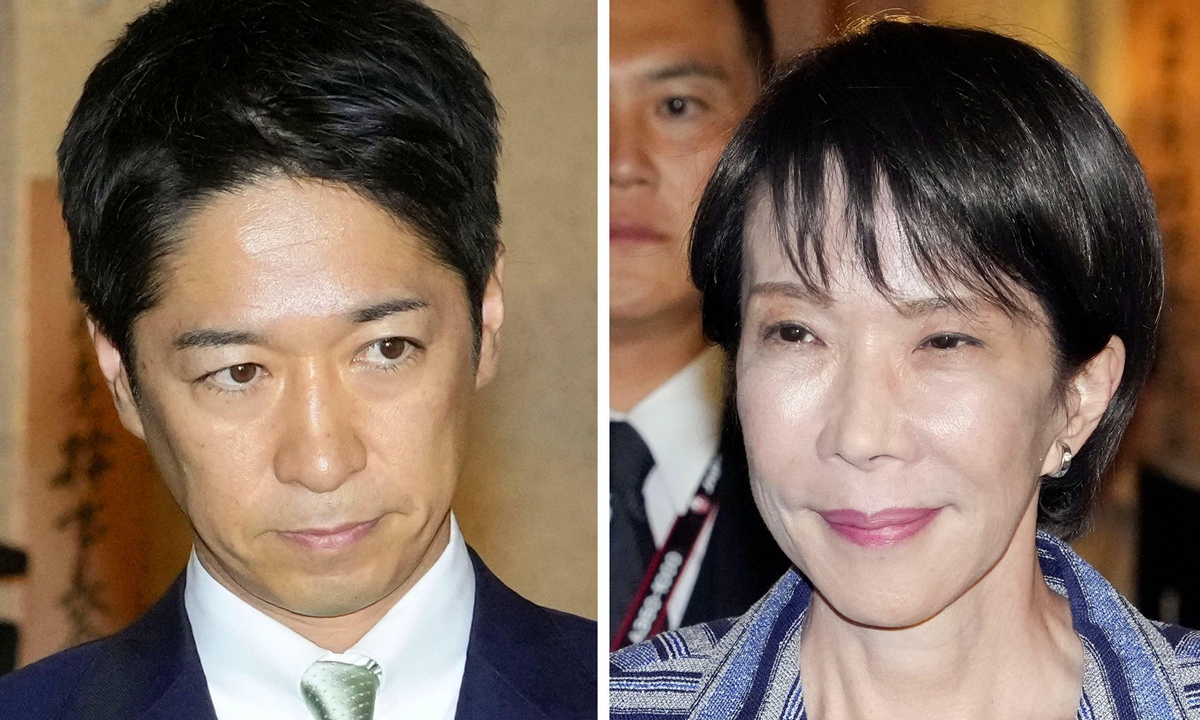
Combined photo shows Japan's ruling Liberal Democratic Party President Sanae Takaichi (R) and the opposition Japan Innovation Party co-leader Fumitake Fujita heading to their meeting in Tokyo on Oct. 17, 2025, ahead of an upcoming parliamentary vote to choose the next prime minister. (Photo by Kyodo News via Getty Images)
Japan's ruling Liberal Democratic Party and the major opposition Japan Innovation Party have effectively agreed to form a coalition, with JIP to offer support from outside the Cabinet, senior officials from both parties said Saturday, Kyodo News reported on Sunday.
JIP leader Hirofumi Yoshimura and LDP chief Sanae Takaichi are expected to sign a coalition agreement on Monday. The move marks a new phase in Japan's multiparty politics following the Komeito party's departure from its 26-year alliance with the LDP.
Kyodo News reported on Sunday that with JIP planning to vote for Takaichi, who was elected LDP president on October 4, in Tuesday's parliamentary vote to select the next prime minister, her election, which would make her Japan's first female premier, is virtually assured.
At their first policy meeting, Takaichi asked JIP to join the Cabinet. But some JIP lawmakers said it would be better to wait until policy progress becomes clear, making it unlikely the party will take Cabinet posts beyond an advisory role to the prime minister. The two parties will set up a consultative body to carry out the coalition deal, according to Kyodo News.
Generally, internal cabinet cooperation involves the cooperating party supplying political appointees to the government, such as ministers, vice ministers and parliamentary secretaries. Nikkei Asia reported that while internal cabinet cooperation grants a party greater influence and decision-making power in policy formation, it also carries significant risks as ministers from the cooperating party become the primary targets for opposition questioning and accountability during deliberations of the National Diet.
The report stated that within JIP, only Seiji Maehara, a former foreign minister and minister of land, infrastructure, transport and tourism, has experience serving as a cabinet minister. Concerns about a lack of experienced personnel persist within the party. The prevailing opinion inside JIP is that they should first observe the progress of their proposed policies before deciding whether to deepen the cooperative relationship with the new administration.
There are also concerns within the LDP regarding this matter. Jiji Press reported on Sunday that LDP-JIP negotiations on forming a coalition government have entered the final stage. However, JIP's 12 demands include issues that the LDP approaches cautiously, potentially creating pitfalls for the coalition government. An LDP insider stated that if an agreement cannot be reached in the negotiations, JIP might turn around and abandon the coalition.
The fundamental motive of the cooperation between the LDP and JIP is to pave the way for Takaichi to become Prime Minister, Wang Guangtao, an associate research fellow with the Center for Japanese Studies at the Shanghai-based Fudan University, told the Global Times. As the Komeito party has withdrawn from the ruling coalition, the LDP must seek new partners to ensure Takaichi's victory in the prime ministerial designation election.
In policy talks with the LDP, JIP proposed political reforms, including a 10 percent reduction in parliamentary seats and a ban on corporate and group political donations.
According to another Jiji Press report on Sunday, JIP has consistently prioritized addressing the politics and money issue, advocating for a complete ban on corporate donations.
According to the regulations, the election of the Japanese prime minister begins with voting and ballot counting in both houses of the National Diet. If any candidate secures more than half of the votes in the first round, they will be designated prime minister. If no candidate achieves an absolute majority, a runoff will be held between the top two candidates, and the one with the most votes will be named prime minister. If the two houses produce different results, a joint committee of both houses will be convened to discuss the matter. Should the committee fail to reach a consensus, the decision of the House of Representatives will prevail. Therefore, the composition of seats in the House of Representatives becomes crucial.
Per Japanese media reports, after the two parties sign the coalition agreement, Takaichi is expected to receive the support of JIP in the election scheduled for October 21, making it highly likely that she will become Japan's prime minister and form a cabinet.
The Japanese edition of Newsweek published an article on Saturday which said that Takaichi is currently facing storms both domestically and internationally. If she becomes prime minister, the deliberation of the supplementary budget for addressing price surges, which she has listed as a top priority, could also reach a deadlock. The possibility of the new prime minister dissolving the Diet and calling a general election cannot be ruled out. Additionally, a series of diplomatic schedules await Takaichi. The article noted that Japan's governance system is gradually hollowing out, and amid the current drastic changes in the global landscape, Japan is in its most vulnerable position. If governance fails, all Japanese people will be affected.
